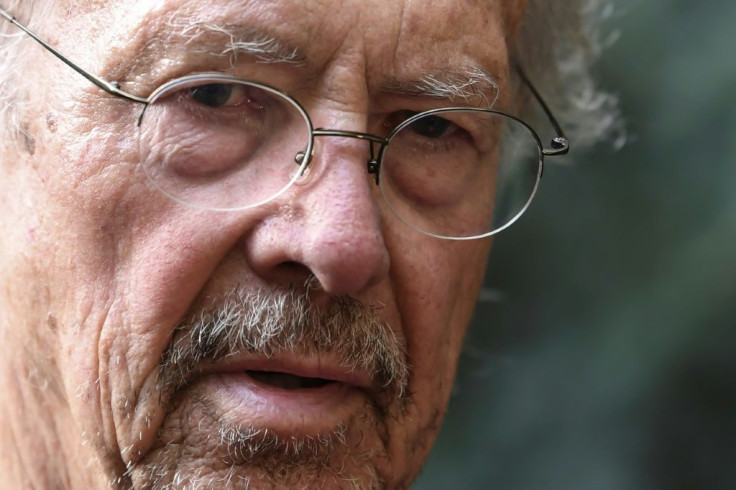Handke's Nobel Riles Balkans And Authors

Austrian writer Peter Handke's Nobel literature prize win has irked the Balkans, while voices beyond the region spoke out against honouring an admirer of late Serbian strongman Slobodan Milosevic.
Artists, including Handke's close friend German director Wim Wenders, voiced satisfaction with the choice to honour a great writer.
Handke's Nobel-winning compatriot Elfriede Jelinek said that he "should have got it (award) before" her.
Polish writer Olga Tokarczuk, who on Thursday won the 2018 Nobel Literature Prize, which was delayed over a sexual harassment scandal, said she was "happy" to be honoured at the same time as Handke, whom she "particularly appreciates".
"For more than 50 years, Handke the poet has been writing a universal literature. This is more important than political wanderings on which he has gone astray," commented Austrian daily Die Presse.
But other prominent writers criticised the decision on Twitter, including novelist Joyce Carol Oates of the United States, who was cited as a possible winner.
"What is this sympathy for slaughterers and not for victims?
"Usually, writers are instinctively on the side of the oppressed and helpless," she tweeted.
Appetite for scandal
"I wrote about Handke's idiocies 20 years ago," said British author Salman Rushdie stressing his "disgust with genocide denialists".
In the 1990s, Handke emerged as a vocal defender of the Serbs during the bloody collapse of the former Yugoslavia, even comparing them to Jews under the Nazis, a remark he later retracted.
His 1996 travelogue "A Journey to the Rivers: Justice for Serbia", caused a storm, and in 1999 he returned Germany's prestigious Buechner prize in protest at NATO's bombing of Belgrade.
Handke also attended the 2006 funeral of Milosevic -- who died while on trial for crimes against humanity, and who wanted Handke to testify in his defence.
Like the late Susan Sontag, who was mobilised in the defence of Sarajevo during its 1992-1995 siege by Bosnian Serbs, Rushdie strongly criticised Handke after his travelogue.
"I guess the Nobel committee's appetite for scandal hasn't been sated," British novelist Hari Kunzru tweeted sarcastically.
US novelist of Bosnian origin Aleksandar Hemon, who left Sarajevo just ahead of the conflict, did not hide his anger.
"Peter Handke is a genocide denier. He supported Milosevic all the way through. What a disgrace!"
Milosevic was tried notably over his role in the Sarajevo siege that claimed 11,000 lives and the 1995 Srebrenica massacre of more than 8,000 Muslim males, the worst atrocity in Europe since World War II.
'When it will snow'
In a fierce editorial The Times newspaper criticised what it labelled a "perverse choice for literature laureate".
"Artistic qualities are independent of politics, and there have been previous laureates of insanitary opinions...
"Yet Handke excels in infamy, as his output over the past 25 years has been dominated by drama and prose relating to the disintegration of the former Yugoslavia," commented the British paper, opining that the award "insults the victims of genocide".
The polemical reaction to the award continued Friday in the Balkans.
In Kosovo, a petition urging that Handke be stripped of his Nobel prize had gathered nearly 30,000 signatures by Friday afternoon.
"Every writer who thinks that his 'genius' puts him outside categories of good and bad cannot be called a human being," Bosnian writer Faruk Sehic said.
For him Handke was an "apologist of evil".
In Serbia, Handke's award was perceived with general indifference.
The Vecernje Novosti daily paper, close to the government, has however put on its front page the Austrian writer who gave several interviews to Serbian media, including to Radio Belgrade, announcing a visit in "late November, when it will snow".
The 1990s wars in Bosnia, Croatia and Kosovo, that accompanied Yugoslavia's break-up, claimed around 130,000 lives and forced millions of people to flee their homes.
© Copyright AFP 2024. All rights reserved.





















